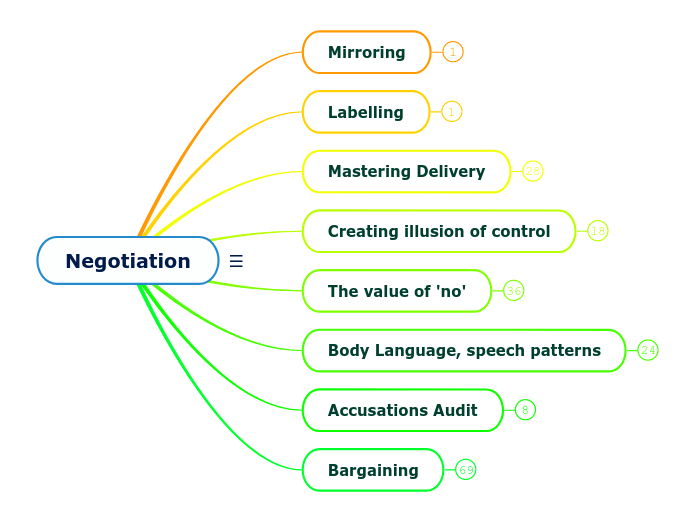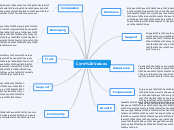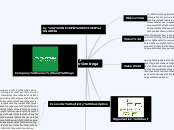Negotiation
Tactical application of emotional intelligence
Bargaining
anchor emotions, not dollars
characterise your amount
you're not gunna like this, but
it may be more than you have
it's probably more than you plan to pay
its gunna be higher than you expect
my numbers high
don't extreme anchor
makes a lot of deals disappear
provide a range
depends upon
how much you can offer
what is going on in the market
the other side will anchor to the side of the range that most favours them
pivot to non-monetary terms
before we get to my offer, lets talk about what it takes to make this a great deal
what else are they willing to throw in to the deal?
Ackerman System
technique
detail
10
I'm tapped out, but I have nice ...
Offer them an object
your shirt
your watch
your jacket
9
8
then offer them 95% of your top number
I'd like to you another number, but I'm gunna have to talk to my partner about this
7
6
5
then offer them 85% of your top number
I'd like to GIVE you another number, but I'm not sure I can even cover this
4
I appeciate it
you're too generous
oh thank you
they must move their number before you can
apply tactical empathy
you're asking a reasonable price, and I'm being ridiculous
I'm so sorry, I can see I've offended you
wait until they ask for your price
Look I've got a price, but you're not gunna like it, so I'm scared to give you the price
the numbers
always increase in decreasing increments
5 objects
4 +5%
3 +10%
2 +20%
1 65%
nutshell
object
final number = odd number
next offer 95%
next offer 85%
initial offer = 65% of target
set target
Accusations Audit
Low stakes practise
Be exhaustive and fearless
Get ahead of negatives
Framing
"feels like ...
feels like
Unexpressed negative emotions never die - they fester and get worse
Inventory all the negatives the other side may be thinking
Body Language, speech patterns
Responding to a lie
show them you are aware of their perspective, and you don't have a problem with it / are trustworthy
be non-judgemental
use "late night FM DJ" voice
I heard you say"XXX", but it seems like something is bothering you?
I heard you say"XXX", but it seems like there is something else
I heard you say"XXX", but it seems like there is something more here than meets the eye
The Pinocchio affect
the use of extra effort/words to cover a lie
Identify Baselines & spot deviations
like a polygrapher
identify truth as a baseline
Watch the Sidelines
the body language of the people not in the spotlight
If something in their communication is off
label the dynamics in front of you
tone of voice is curious
I heard you say"XXX", but I also heard something in your tone of voice that made you hesitate
7 / 35/ 55 rule
Body Language
8x more important than the words
Tonality
5x more important than the actual words
Content
The value of 'no'
use 'no' to get an answer
use how or what to proceed
what are we going to do if we go offtrack?
how do we know if we're offtrack?
must transition from 'no' to 'how'
a 'yes' without a 'how' will die
the value of 'no'
no comittment fears
replace
3
are you against committing to xxxx now?
can you commit to xxx?
2
do you disagree with this?
do you agree with this?
1
Is this a ridiculous idea?
is this a good idea?
people feel safe and protected to say 'no'
has so much more value than a 'yes'
the danger of 'yes'
the danger
the 'yes' is a rejection in waiting
the 'yes' can still lead to a 'no' later
Does this look like something that could work for you?
counterfeit 'yes'
not a short answer usually
suuuuure
yeeeeahh
no trust
feeling trapped
commitment 'yes'
fairly curt and concise too
confirmation 'yes'
fairly concise and curt
legitimate
Creating illusion of control
ask legitimate questions
how have you made this deal in the past?
how do I know that ...
how have you worked with people like me in the past?
how are we going to move forward?
Avoid triggering Reciprocity
if I ask, I should be willing to give
if we ask, we tend to owe
Use 3 calibrated questions to shape thinking
HOW do I overcome the challenges here?
HOW I am going do that?
WHAT is going to happen if I do that?
ask questions to force Empathy
How I am supposed to do that?
Do NOT use "Why" questions
people feel accused of doing something wrong
people feel defensiveness
Ask "How" and "What" questions
Mastering Delivery
Uninfluential
use of "I", "me", "my"
Shrewd negotiators
use of "they", "them"
Digital Comms
end positively
say
I'm afraid
I'm sorry
one good move each communication
keep short
Inflections
inquisitive
curious
declarative
stating a fact
use the "FM DJ" voice
calms down
use the "Analyst" voice
lacks warmth
need to be immovable on this accent
use the "playful" voice
use 80% time
ditch the "Assertive" voice
always counterproductive
hit their mirror neurons
smile
late night FM DJ voice
Labelling
define and label
Mirroring
repeat key words with inflection up









